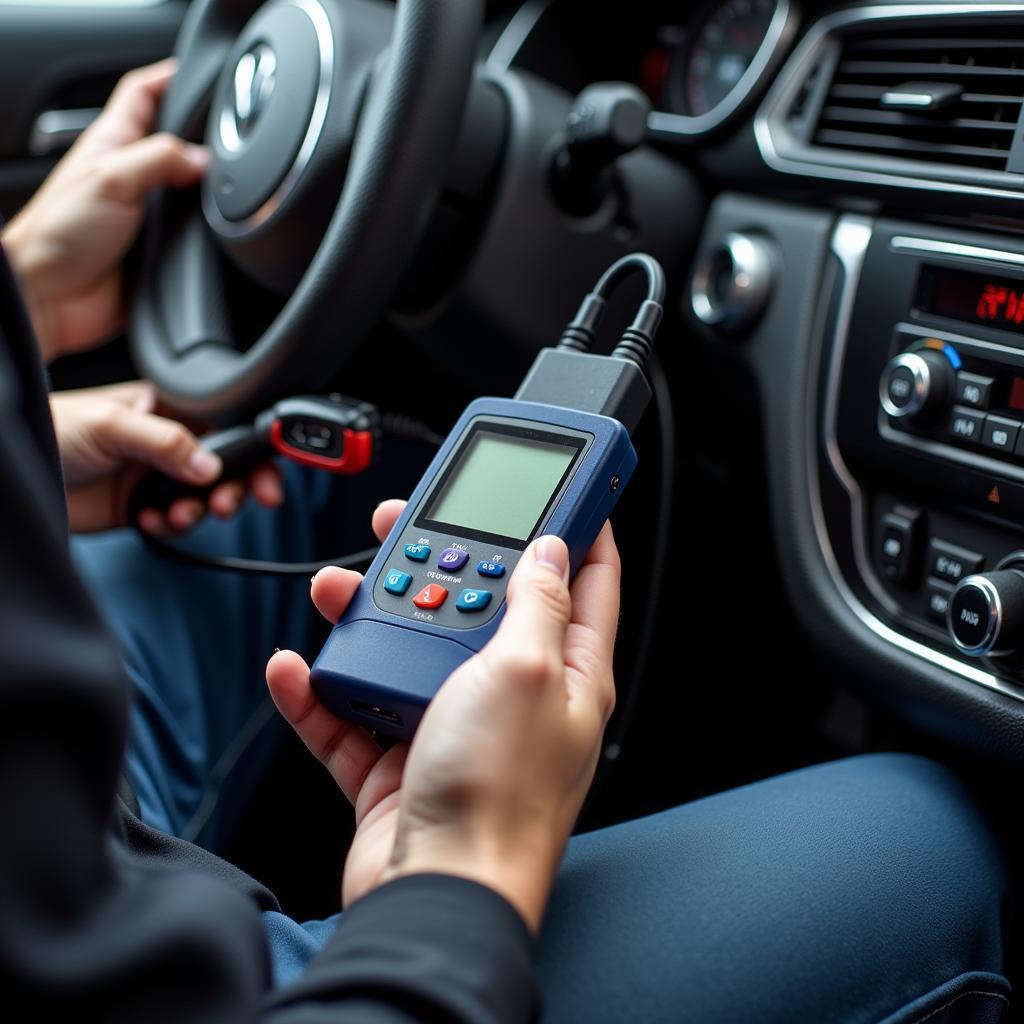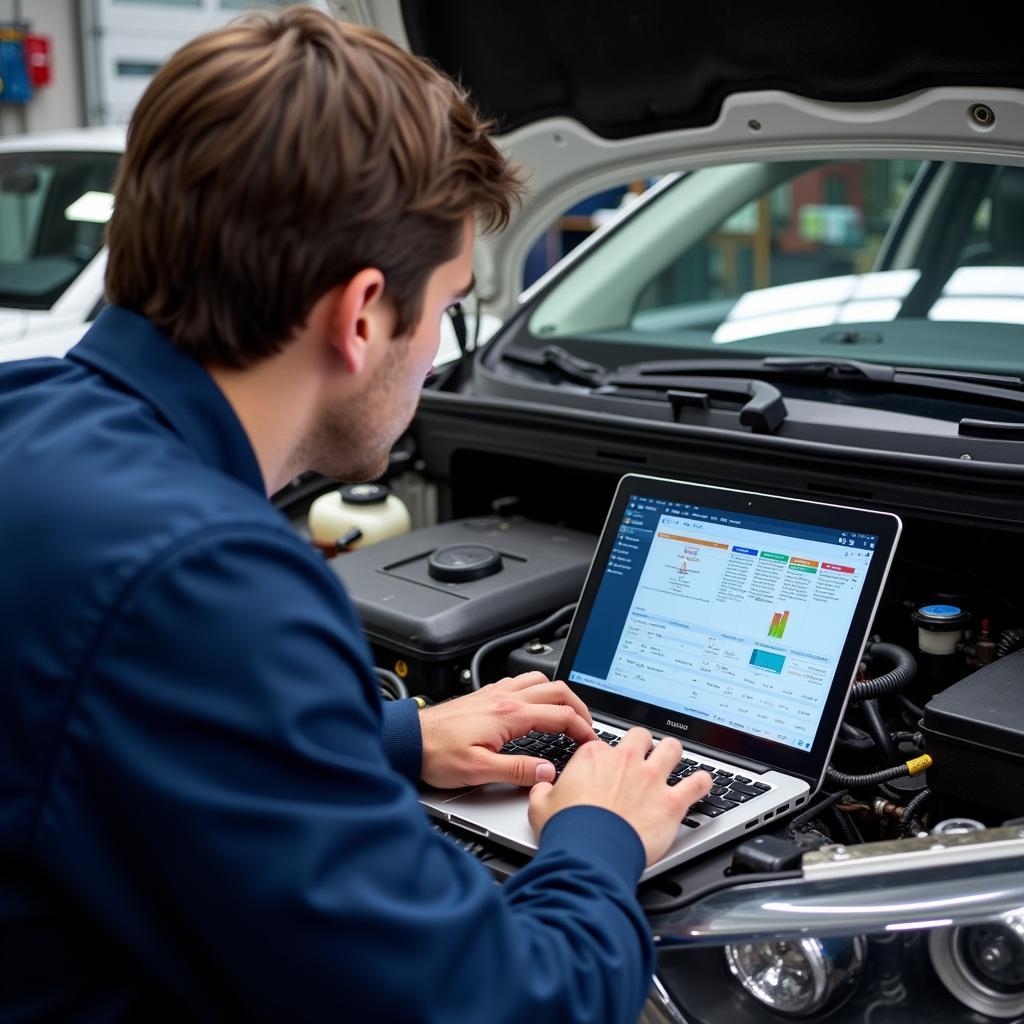Modern vehicles are complex machines with intricate systems controlled by computers. While this technology makes our cars safer, more efficient, and more enjoyable, it also means that when something goes wrong, it’s not always as simple as a mechanic taking a quick look under the hood. That’s where car diagnostics come in.
A car diagnostic test, often referred to simply as “running diagnostics,” is like giving your car a comprehensive health check-up. It involves connecting a specialized tool, called a car diagnostic scanner, to your car’s onboard computer system – the Engine Control Unit (ECU). This scanner reads and interprets data from various sensors located throughout your vehicle, revealing hidden problems and providing valuable insights into your car’s overall health.
Common Reasons Why Your Car Needs a Diagnostic Test
While a check engine light is the most obvious sign you need a diagnostic, there are several other reasons why taking your car for diagnostics is crucial:
- Illuminated Warning Lights: The appearance of any warning light on your dashboard, like the check engine light, ABS light, or airbag light, often indicates an underlying issue that needs further investigation.
- Performance Issues: Experiencing problems such as rough idling, stalling, decreased fuel efficiency, or a lack of power can be signs of a malfunctioning system that a diagnostic test can pinpoint.
- Unusual Noises: Strange sounds coming from your engine, transmission, or exhaust system can be early indicators of potential problems that a diagnostic test can identify before they escalate into major repairs.
- Scheduled Maintenance: Even without any apparent issues, it’s wise to include a diagnostic test as part of your routine car maintenance schedule. This preventative measure can help detect minor problems early on, preventing costly repairs in the future.
 Car Diagnostic Scanner
Car Diagnostic Scanner
What a Car Diagnostic Test Can Reveal
Car diagnostic tests offer a wealth of information about your vehicle’s health. They go beyond just reading error codes and can provide insights into various systems, including:
- Engine Performance: Analyzing data related to fuel/air mixture, ignition timing, and emissions control to diagnose issues affecting engine performance and efficiency.
- Transmission System: Identifying problems with gear shifting, clutch operation, or fluid levels that could indicate transmission issues.
- Brake System: Checking the functionality of ABS, traction control, and other components to ensure optimal braking performance and safety.
- Exhaust System: Monitoring emissions levels and detecting problems with the catalytic converter or oxygen sensors.
- Safety Systems: Evaluating the health of airbags, seatbelt pre-tensioners, and other safety-critical components.
The Benefits of Regular Car Diagnostics
Don’t make the mistake of thinking diagnostics are only necessary when your car is acting up. Regular diagnostic checks offer significant benefits:
- Early Problem Detection: Identifying issues in their early stages often translates to less expensive and less invasive repairs.
- Preventative Maintenance: Catching minor problems before they snowball into major ones can save you significant time and money on costly repairs down the line.
- Improved Fuel Efficiency: Addressing issues affecting engine performance, such as a faulty oxygen sensor, can lead to better fuel economy.
- Increased Safety: By detecting problems with brakes, airbags, and other safety systems, you can ensure your vehicle remains safe to drive.
- Higher Resale Value: A well-maintained vehicle with a documented service history, including regular diagnostic checks, will generally command a higher resale value.
 Mechanic Analyzing Diagnostic Report
Mechanic Analyzing Diagnostic Report
Where to Get a Car Diagnostic Test
Knowing where to take your car for a diagnostic test is crucial. You have several options:
- Dealerships: While generally more expensive, dealerships have specialized equipment and technicians trained specifically for your car’s make and model. Where can I get my car on diagnostics? We help you find the best places.
- Independent Garages: Reputable independent garages often offer diagnostic services at more competitive rates than dealerships.
- Auto Parts Stores: Many chain auto parts stores offer free or low-cost basic diagnostic code reading services. However, keep in mind that these may not be as comprehensive as those offered by dealerships or independent garages.
“Choosing the right place for your car diagnostic can be just as important as the test itself,” says John Smith, Senior Automotive Technician at ABC Auto Services. “Make sure to opt for a reputable mechanic with experience and the right tools for accurate diagnosis and repair.”
Don’t Ignore the Signs, Get Your Car Diagnosed
In today’s world of sophisticated car technology, a car diagnostic test is no longer optional – it’s an essential part of responsible car ownership. Regular diagnostics, coupled with prompt attention to warning signs and performance issues, are your best defense against unexpected breakdowns and costly repairs. By understanding the importance of car diagnostics and staying proactive with your car’s maintenance, you can enjoy a smoother, safer, and more cost-effective driving experience.
FAQ:
- How often should I get my car diagnosed? It’s generally recommended to get your car diagnosed at least once a year or every 12,000 miles, even if you don’t notice any issues.
- Can I perform a car diagnostic test myself? Yes, affordable DIY car diagnostic scanners are available. However, keep in mind that these may not be as sophisticated as professional-grade scanners and interpreting the results may require some technical knowledge. If you’re unsure, it’s best to leave it to the professionals. What’s the best car diagnostic tool? Find out in our comprehensive guide.
- Is a car diagnostic test the same as an inspection? No, they are not the same. A diagnostic test focuses on the electronic systems of your car, while an inspection is a visual check of your car’s overall condition, including lights, tires, brakes, and other components.
Don’t let a small issue become a major problem. Can diagnostic anything wrong with a car? Learn more about the capabilities of car diagnostics. Need to schedule a car diagnostic test? Where to get a car diagnostic? We can help! Contact our team at WhatsApp: +1(641)206-8880, Email: [email protected] for 24/7 support and expert advice.

Leave a Reply